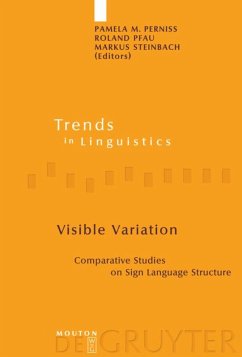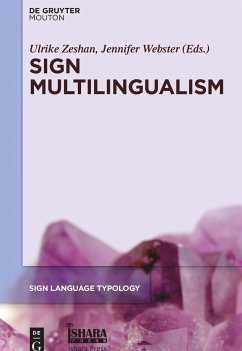
Sign Languages in Village Communities
Anthropological and Linguistic Insights
Herausgegeben: Zeshan, Ulrike; de Vos, Connie
Versandkostenfrei!
Versandfertig in 6-10 Tagen
179,95 €
inkl. MwSt.

PAYBACK Punkte
0 °P sammeln!
The book is a unique collection of research on sign languages that have emerged in rural communities with a high incidence of, often hereditary, deafness. These sign languages represent the latest addition to the comparative investigation of languages in the gestural modality, and the book is the first compilation of a substantial number of different "village sign languages". Written by leading experts in the field, the volume uniquely combines anthropological and linguistic insights, looking at both the social dynamics and the linguistic structures in these village communities. The book inclu...
The book is a unique collection of research on sign languages that have emerged in rural communities with a high incidence of, often hereditary, deafness. These sign languages represent the latest addition to the comparative investigation of languages in the gestural modality, and the book is the first compilation of a substantial number of different "village sign languages". Written by leading experts in the field, the volume uniquely combines anthropological and linguistic insights, looking at both the social dynamics and the linguistic structures in these village communities. The book includes primary data from eleven different signing communities across the world, including results from Jamaica, India, Turkey, Thailand, and Bali.
All known village sign languages are endangered, usually because of pressure from larger urban sign languages, and some have died out already. Ironically, it is often the success of the larger sign language communities in urban centres, theirrecognition and subsequent spread, which leads to the endangerment of these small minority sign languages. The book addresses this specific type of language endangerment, documentation strategies, and other ethical issues pertaining to these sign languages on the basis of first-hand experiences by Deaf fieldworkers.
All known village sign languages are endangered, usually because of pressure from larger urban sign languages, and some have died out already. Ironically, it is often the success of the larger sign language communities in urban centres, theirrecognition and subsequent spread, which leads to the endangerment of these small minority sign languages. The book addresses this specific type of language endangerment, documentation strategies, and other ethical issues pertaining to these sign languages on the basis of first-hand experiences by Deaf fieldworkers.














